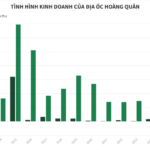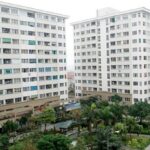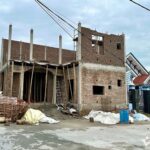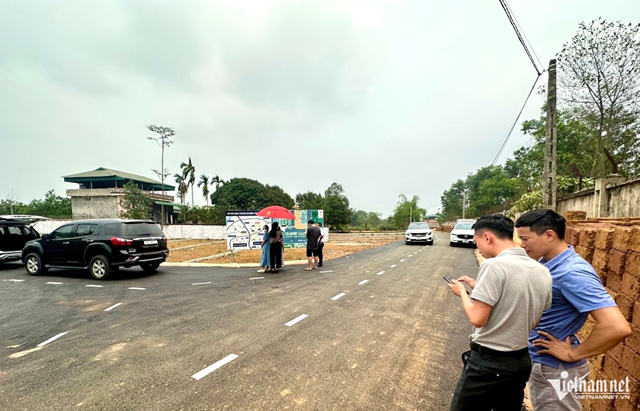On September 4th, the Ministry of Construction held a discussion meeting to review and provide feedback on the draft decree by the Government detailing the National Housing Fund and measures to implement Resolution No. 201/2025/QH15 dated May 29, 2025, of the National Assembly.
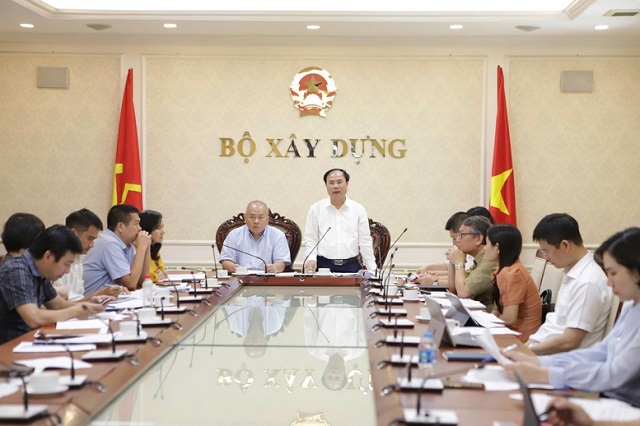
The meeting was co-chaired by Mr. Nguyen Van Sinh, Deputy Minister of Construction, and Mr. Do Thanh Trung, Deputy Minister of Finance – Photo: Construction Newspaper
|
The Ministry of Construction has developed a draft on the establishment of the National Housing Fund and has sent it for feedback from ministries, sectors, and localities. The draft is now finalized and ready for submission to the Government.
The Provincial People’s Committee (PPC) will establish the fund at the local level and act as the owner representative to manage the fund.
Ms. Tong Thi Hanh, Director of the Housing and Real Estate Market Management Department under the Ministry of Construction, introduced the draft, which consists of 7 chapters and 27 articles.
Notably, Chapter 2 clarifies the legal status and operational objectives. The Government will establish the fund and assign the Ministry of Construction as the owner representative and manager. The PPC will set up the local fund and act as the owner representative and manager.
Regarding financial management, the PPC will decide on the establishment of a new fund or the reorganization of an existing fund managed by the PPC or entrust another local financial fund with management. However, it must ensure that the fund operates according to the purpose specified in Resolution No. 201/2025/QH15 and this decree.
If the PPC decides to entrust the local development investment fund or another local financial fund with managing the local housing fund, the receiving fund must establish a steering committee to manage the local housing fund.
Chapter 2 also outlines the fund’s operational objectives, principles, tasks, and rights; capital sources; and organizational structure.
Chapter 3, on Financial Management, details the financial regime (including salary and allowance policies for management and staff) and the management and use of the fund’s assets, following the regulations for public non-business units. The fund will organize its accounting system according to accounting law and perform accounting and statistics tasks as per legal regulations.
Chapter 4 covers the receipt, management, and use of support and contributions from domestic and foreign organizations and individuals. It specifies the principles, modalities, procedures, and authority for deciding on the receipt of support and contributions; the procedures and content of the document for receiving support and contributions; the process of receiving support and contributions; the signing and confirmation of receipt; and the use of the support and contributions.
Chapter 5, on Investment, Creation, Management, and Rental of Housing, outlines the principles of investing and creating housing; the forms and procedures for investing in and building social housing for the fund; the target tenants; rental prices and procedures; and the management and operation of the housing.
Chapter 6, on Inspection of Fund Activities, states that the fund is responsible for developing and issuing an internal inspection regulation to ensure effective operations, in line with its functions, tasks, and authority as per this decree.
The fund is also responsible for periodically or occasionally reporting to the Ministry of Construction and the PPC about its activities, capital and asset management, and any difficulties or suggestions for improvement.
Chapter 7 covers the amendment and supplementation of several articles of Decree No. 192/2025/ND-CP dated July 1, 2025, and Resolution No. 201/2025/QH15, detailing the responsibilities of ministries, sectors, and localities; the fund’s responsibilities; transitional implementation regulations; and enforcement provisions.
The National Housing Fund will only provide rental services and not engage in buying or selling real estate.
Providing additional information on the establishment of the National Housing Fund, Mr. Do Thanh Trung, Deputy Minister of Finance, said: “Previously, we followed a model where the fund was outside the state budget but operated as a one-member limited liability company.”
“The spirit of Resolution No. 201/2025/QH15 is to pilot some mechanisms and policies for developing social housing, and this fund is only for renting, with no buying or selling. In other words, the fund does not engage in real estate trading but ensures the provision of rental services, formed from the state budget and legal contributions from other sources,” explained the Deputy Minister of Finance.
Therefore, the Ministry of Finance has studied a direction where the fund is outside the state budget but operates as a public non-business unit. Thus, the fund has the function of ensuring rental services rather than providing houses, fulfilling the political tasks assigned by the State.
In terms of operation, the fund will initially have state support in the form of charter capital and operating expenses, both at the central and local levels. After the fund is operational and starts generating revenue, it will become self-sufficient. Subsequently, the fund will perform other tasks, make depreciation provisions, and ensure the preservation of state assets.
“The relationship between the central and local funds is also an important issue. In large cities and localities with developed industries, economic zones, and industrial parks, the relationship between the two funds is crucial for regulating demand, project locations, and efficient fund utilization,” said Mr. Do Thanh Trung, Deputy Minister of Finance.
A representative of the Hanoi Department of Construction shared their perspective: “If we leave the task of renting to businesses, it will be challenging to attract investors. Therefore, transferring this responsibility to the state will bring long-term value, and the state will not have to continuously allocate social housing funds. Since land resources are limited, we cannot keep providing social housing indefinitely. Thus, this fund will, to a certain extent, recycle the demand for rentals.”
In addition, there should be a mechanism to regulate the selection of specific projects to prevent businesses from offloading their excess inventory to the state. At the same time, there should be regulations on construction quality. When the state purchases housing, it is necessary to avoid situations where developers reduce construction quality to increase profits. Quality control should be implemented from the time of purchase to the final acceptance of the project to prevent state fund wastage.
A representative of the Ho Chi Minh City Department of Construction proposed dedicating separate sections for the National Housing Fund and the Local Housing Fund. Additionally, they suggested supplementing the working relationship and coordination between the local and national housing funds.
Regarding objectives, the Ho Chi Minh City Department of Construction recommended including the creation of a housing fund through the allocation of resettlement housing. In the past, the city has also repurchased resettlement housing to convert it into social housing or housing for public employees serving specific groups.
“The Ministry of Construction should also have a flexible mechanism to identify beneficiaries, especially those renting in separate houses in residential areas, as this group accounts for a large proportion in Ho Chi Minh City,” the representative added.
Mr. Nguyen Van Sinh, Deputy Minister of Construction, affirmed that the Ministry of Construction would absorb the opinions and contributions from agencies and ministries to finalize and submit the draft to the Government within the stipulated timeframe.
– 08:35 05/09/2025
The Latest Directive: Establishing a Fund for Relocation Housing and Land
The Department of Construction has been tasked by the Ho Chi Minh City People’s Committee to establish a fund for housing and land to serve resettlement purposes. This task is based on the needs for resettlement arrangement and the proposal to invest in the construction of resettlement areas by various units. A report on the implementation results must be submitted before October 15th.
Once a Billion-Dollar Profit-Maker, This Real Estate Giant Now Targets 40,000 Affordable Housing Units Despite Modest Earnings.
The struggling situation of Dia Oc Hoang Quan, a real estate company, is a cause for concern. With a dismal track record of failing to meet business targets for nine consecutive years, their annual profits barely scrape over $1 million. The years 2021 and 2023 were particularly grim, with meager profits of just $174,000 to $218,000. This underperformance paints a picture of a company in dire need of a strategic overhaul to reverse its fortunes.
“National Housing Fund Suggestion: Renting Homes, Not Trading or Selling”
The National Housing Fund is a revolutionary initiative, stemming from Resolution No. 201/2025/QH15, which pilots special mechanisms and policies for social housing development. This fund is unique in its nature, operating as a rental-only model, where units are ‘entered but never leave’. Instead of buying and selling, the fund solely focuses on providing a stable and accessible rental service, funded by the government and legal contributions from various sources. This innovative approach aims to create a sustainable and inclusive housing solution for those in need.
“Streamlining the Permit Process: The Ministry of Construction Proposes a 7-Day Maximum Turnaround for Building Permits”
The Ministry of Construction has proposed a streamlined approach to administrative procedures for construction projects. Under this proposal, each project will undergo a single administrative procedure during the preparation stage up until the commencement of construction. This initiative aims to significantly reduce the time required for permitting processes, with a target of issuing permits within a maximum of seven days.



























